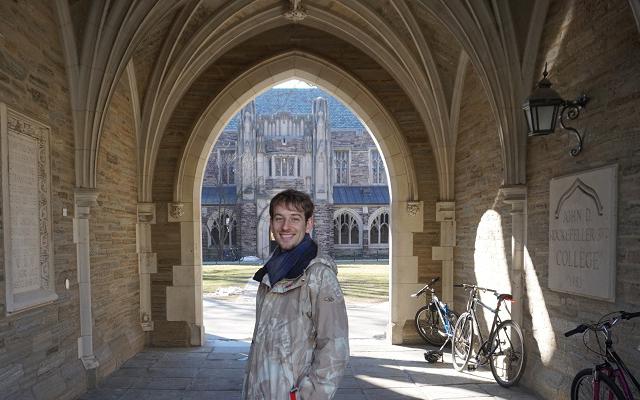
The Keller Center recently caught up with Pascal Wenz, a Princeton Startup Immersion Program (PSIP) intern who spent the summer of 2017 working at Samurai Incubate Inc. in Tel Aviv. Pascal was one of our first graduate students to take part in PSIP and is currently working at EXest, a Japanese startup in Tokyo.
KC: As a graduate student in the department of Religion what drew you to the Keller Center? To entrepreneurship in general? And how did you fit our programs/courses into your department’s schedule?
PW: In the study of religion, we examine texts and traditions that go back hundreds, if not thousands of years. In contrast, entrepreneurship is about the future - what kind of society do we want to help create. I found it really refreshing to be able to combine these two approaches because I care about both, the past and the future. The Keller Center seemed to be the best place to get started.
I was able to fit the programs and courses into my department’s schedule because I wanted to do both, and if there’s a will there’s a way. And my academic supervisor, Professor Jacqueline Stone, was extremely supportive of my decision to explore entrepreneurship.
I encourage other graduate students to get out of their comfort zones and experience business/entrepreneurship. An internship is just one of many options to do so.
KC: I wonder if you can talk about the alternative pathway you took as a graduate student, and where you found support to make unconventional choices in your academic career.
PW: Descriptors such as “alternative” or “unconventional” assume that there is a standard path that you can take. I do not think there is a “conventional” way to do things – there are only choices that people make in getting from point A to point B that feel right for them.
You might describe most of my career choices as unconventional - my decision to study Japanese religion at university; my decision to leave Princeton graduate school after only two years to pursue entrepreneurship. My decisions are just an outcome of what I think is the right thing to do for me at that time. I am planning to take an MBA in the future, just like millions of other people who want to advance professionally. It is not because it’s the conventional thing to – it is just because I want it for myself.
I would therefore argue that the only real support that you have in choosing your career path is yourself. That said, there are many resources that supported me. In addition to being academically rewarding, Princeton offered me psychological and career counseling, professional development seminars and the opportunity to explore entrepreneurship. It also helped me build some friendships that I hope will last for a long time. It’s important to take the initiative in getting the resources that you need based on the options available to you.
KC: What are you up to now? How has your experience here at the Keller Center influenced where you are today?
PW: My experience at the Keller Center has enabled me to be where I am right now - working at a managing position at a Japanese start-up.
How has the Keller Center helped me in my career? It has given me the inspiration to try something new. It has given me the courage to take risks. And it has given me a framework to evaluate business opportunities.
More specifically, I was fortunate to be able to participate in Professor Chris Kuenne’s High-Tech Entrepreneurship seminar, the best class I ever took in my nine-year academic journey. I encourage any graduate student to apply for admission to it. Full stop.
In addition, I received Princeton’s financial support to take part in the Princeton Startup Immersion Program in Tel Aviv in the first batch of the program, as the only graduate student. As part of my program, I interned at the Israeli branch of a Japanese venture capital firm. While my knowledge of Japanese language and culture was an asset, I quickly learned that venture capital is not an ideal starting point for people without extensive business experience. That is why, after the program, I decided to first get more experience at an established company first before returning to entrepreneurship. I worked for one year at an international consulting firm in Tokyo, which was tough but ultimately helped me get my current job.
I encourage all graduate students, in any field of study, to give entrepreneurship a try. Most of my friends are PhD students or former PhD students and what all of them share is intellectual curiosity, a strong work ethic, the desire to make some sort of contribution (social or intellectual), and the desire to be self-determined and free in their decision making. All of these qualities go well with entrepreneurship. If you are at Princeton and want to try entrepreneurship but don’t know where to start, let the Keller Center help you.
My personal advice to any undergraduate would be this: spend your undergraduate years doing what you are passionate about, but make sure that you learn enough to be able to go to graduate school – just to keep your options open. Education may be an investment but it’s never a waste of time, if it benefits you either personally or professionally.
If you are also trying to figure things out for yourself, I would be extremely happy if my story were an inspiration to you. I also hope it helps to give you the courage you need to make your own choices, without using other people’s choices as a frame of reference.
KC: Thank you, Pascal, kouun wo inoru!
